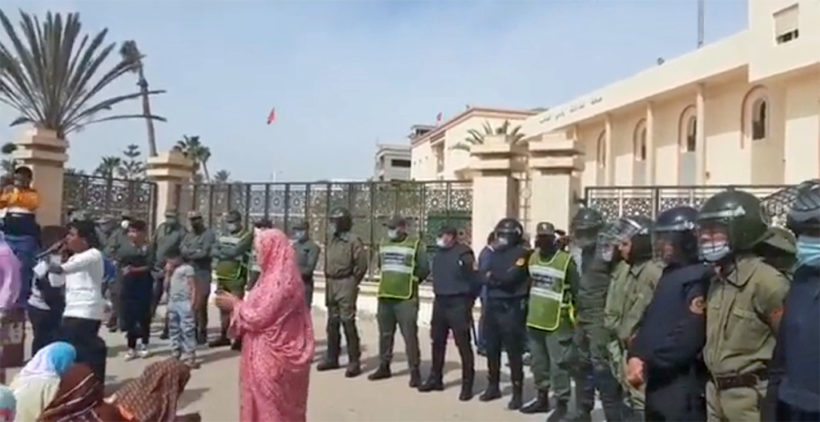The occupying forces yesterday stormed violently into the occupied city of Dakhla, attacking participants in demonstrations which have been taking place over the last few days over the disappearance of Lahbib Aghrichi, a Saharawi.
These demonstrations, peaceful and well organised, saw an increase in the number of participants from 7 February, reaching over a thousand, until on the 21st the police, auxiliary forces and paramilitaries attacked, brutally assaulting those gathered with beatings and arrests, breaking the windows of Saharawi cars, creating terror. Shots were heard. They created raids to search for individual Saharawis, raiding houses by kicking in the door, beating the inhabitants, causing destruction and blocking Saharawi neighbourhoods. They needed reinforcements from other towns in the occupied areas.
The Saharawi activist Rachid Esghayer, a former prisoner of the Salé 7 group, was arrested. During one of the demonstrations, he raised his voice to denounce the corruption in Dakhla, organised from Rabat, Tangiers and Casablanca. He revealed the danger of extermination in which the Saharawis are living, pushed into ghettos, displaced by the Moroccan settlers. He also denounced the practices of the police against the Saharawis, such as the sexual abuse of Saharawi women during arrests.
The origin of these demonstrations lies in the disappearance of the Saharawi trader, Lahbib Aghrichi, on the 7th. After a week of demonstrations, the police reported finding a bag containing his charred remains, of which only bones and teeth remained. They said they had carried out a DNA test, which they claimed to be Lahbib Aghrichi.
The protesters demanded justice for Lahbib and the circumstances of his disappearance. They called for an end to police corruption. They chanted slogans about Lahbib’s disappearance “rest in peace, we will continue the struggle” and also political slogans calling on the occupying authorities to stop the crime of colonisation and asking the Saharawi people for more unity and cohesion to face what they called “slow genocide”. “One, one, one, one, the Saharawi people united”.
The family had very forceful interventions, outraged at police corruption: they asked how a person the police said they were watching, the Moroccan Aataoui, turned up tortured and dead. And how could the police say that he had committed suicide. And why did the police foist the responsibility for Lahbib’s death on him. They asked for the identification of the person who was shown in a video driving Lahbib Aghrichi’s car. They wanted justice and held the occupation authorities responsible for their son’s disappearance.
Naama Aghrichi, Lahbib’s brother, wondered whether, when he saw the police burning something, it might not be his brother’s body.
On the one hand, the police promised to hand over the charred remains to the Aghrichi family within 24 hours, a promise they have not kept. The family demanded an independent autopsy in the Canary Islands, in Europe. The death certificate provided to the family by the authorities bears no official stamp or signature, casting doubt on its authenticity.
Esghayer claims to echo the sentiments of Saharawis who do not believe the governor by saying he will investigate to the last consequences.
In addition to activist Esghayer, two brothers of Lahbib Aghrichi are in custody. For now, there is confirmation of four other Saharawis in detention.










